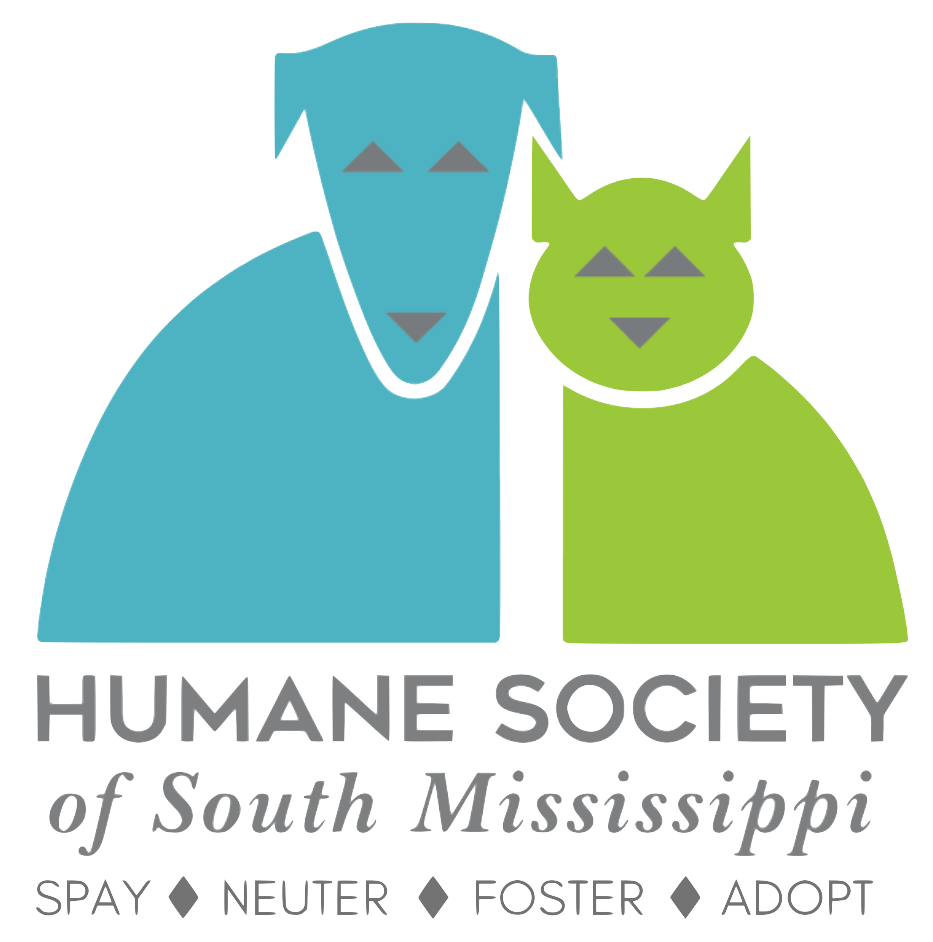
JOIN US. BE A VOICE FOR THE VOICELESS.
Click on the buttons below to view current municipal animal ordinances.
What is Pet Over-population?
Do you love animals? Do you own a dog? Do you consider your dog as a family member? If you answered “Yes” to all three questions, chances are that you are a responsible pet owner. Did you know that a pet overpopulation problem exists in South Mississippi, and it is getting worse? Chances are that you aren’t sure what the last statement means let alone how it might affect you personally.
Pet overpopulation is defined as a surplus of pets when compared to demand for ownership by people. The term applies to dogs and cats, but we are going to focus on dogs in this message. In our community the best measure of the magnitude of the overpopulation problem is the number of dogs that enter the Humane Society of South Mississippi (HSSM) in Gulfport annually.
The number of dogs entering HSSM is extremely high (4,206 year to date) and increasing at an alarming, unsustainable rate not seen in over a decade. If the pace continues, over 5,400 animals will enter the facility by yearend. HSSM is fortunate to have strong community support. Each time we face a capacity crisis our amazing supporters bail us out, temporarily at least. Complicating matters are a decline in adoptions, fewer foster homes for dogs, and shrinking opportunities to transport dogs to other parts of the country. The time has come to address the root causes of this unsustainable trend and turn it around, not temporarily, but permanently.
The surplus of dogs is made up, broadly speaking, of three sources: an oversupply of puppies (in other words, unwanted births), owners surrendering dogs (for any of several possible reasons), and owners failing to contain their dogs resulting in a dog becoming a free roaming stray. These dogs enter shelters across the country by the millions annually, but closer to home HSSM receives 5,000 dogs in any given year. The mission of HSSM is to save and enhance the lives of pets. Sadly, hundreds of those dogs end up being euthanized because of preexisting injuries, illnesses, and behavioral issues. Sadder though is that many are euthanized because of behavioral and mental health problems that arise from extended confinement at the shelter. But the worst-case scenario is being faced with the previously unthinkable situation of euthanizing healthy, adoptable dogs to make space for more dogs.
Potential Solutions
Solving this problem sounds easy in theory but in practice it is seemingly impossible. Consider each of the three categories cited above: oversupply of puppies, owner surrenders, and strays.
Spay – neuter surgery is the indisputable way to control dog reproduction. Yet despite over 50 years of advocacy for spay – neuter surgery nationally as well as locally, many South Mississippi residents are reluctant to take advantage of low cost, and often free, spay – neuter services. Common excuses range from wanting just one litter to concerns about behavior changes, weight gain, and other health issues. There is no medical basis for any of those excuses. Unlicensed backyard breeders account for a high percentage of surplus puppies. Situations arise all too often where HSSM assists law enforcement with rescuing dozens of dogs from deplorable conditions. Clearly, spay / neuter service is a vital part of the solution to a root cause of pet overpopulation, but controlling reproduction is not enough. A 2016 Purdue University study draws the same conclusion.
Owner surrenders are another matter that can be tricky to handle. Although an element of our society treats dogs as disposable, many people in our community love and desperately want to keep their dogs but can’t afford the cost of food and veterinary care so they surrender them. Recent economic challenges including loss of income coupled with inflation have produced more owner surrenders. HSSM gives away thousands of dollars in food and veterinary care every year to help families in hardship circumstances retain their dogs. Generous donors make those gifts possible. We must explore other ways to make resources available to those in need. Two subcategories of surrenders are owners who buy a puppy for their children then later decide they’ve made a bad decision and owners who won’t invest their time in training and subsequently surrender their dog because of behavior issues. We call such people negligent pet owners. Education is key to changing the way people in the former group think. Access to training can help the latter group.
Strays are the biggest part of the pet overpopulation problem for several reasons. Compared to the other two groups, strays pose greater public health and safety risks. Free roaming strays contract and spread contagious diseases, engage in uncontrolled breeding, and in some cases become aggressive toward other dogs and people. Frequently strays come to the shelter with serious injuries from encounters with moving vehicles as well as abusive people. More than anything else though, strays are the most challenging group because reuniting strays with their owners scores a dismally low 15% success rate. Gulfport and Harrison County are the main sources of strays (Over 2,500) but the rest of the coastal community contributes their share. Improving the return to owner success rate depends on the ability to identify a dog’s owner.
Path Forward
Up to now, HSSM has successfully managed the South Mississippi pet overpopulation problem within the confines of their facility, including temporary situations of being over capacity. That success has kept pet overpopulation out of the view of the general public. Now however HSSM is in a chronic state of being over capacity. Over capacity is the new normal. Expanding capacity could provide temporary relief but it fails to address the root causes of pet overpopulation. A different approach is needed and needed now.
The Humane Society of South Mississippi proposes that starting now a long-term solution to pet overpopulation will consist of a collaborative approach involving the community of responsible pet owners, municipal and county governments, and HSSM. Key elements of the future approach will include:
• Raising public awareness of the problem
• Researching appropriate solutions to root causes
• Promoting collaboration among all pet overpopulation stakeholders • Advocating for adequate funding to ensure sustained success
We invite caring people to join us now in our initiative to solve the pet overpopulation problem in South Mississippi!
Resources for Animal Advocates
Mississippi Animal Cruelty Laws: Learn more about Mississippi’s current animal welfare laws.


